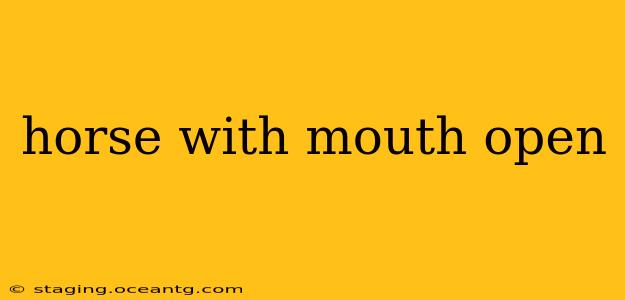Seeing your horse with its mouth open can be concerning. While sometimes it's simply a normal behavior, other times it can signal underlying health issues or discomfort. This comprehensive guide will explore the various reasons why a horse might have its mouth open, helping you determine when a veterinary visit is necessary.
Is My Horse Panting? The Significance of Breathing
One of the most common reasons for a horse's mouth being open is panting. Unlike dogs, horses don't pant extensively as a primary cooling mechanism. Heavy panting warrants immediate attention. It could indicate:
- Overexertion: Strenuous exercise, especially in hot and humid conditions, can lead to labored breathing and an open mouth. This is usually temporary and resolves with rest.
- Heat Stress: Horses are susceptible to heatstroke. If your horse is panting excessively, has elevated heart rate, and is exhibiting signs of distress (sweating profusely, staggering), seek veterinary help immediately.
- Respiratory Issues: Conditions like pneumonia, asthma, or other respiratory infections can cause a horse to breathe through its mouth, often accompanied by a cough, nasal discharge, or labored breathing.
- Pain: Pain, whether from colic, dental issues, or other sources, can cause a horse to breathe shallowly and keep its mouth open.
Could It Be a Dental Problem?
Dental problems are a frequent culprit behind a horse's open mouth. Horses' teeth continuously grow throughout their lives, and any irregularities can lead to discomfort and altered breathing patterns. Common dental issues include:
- Sharp points or hooks: Uneven tooth wear can create sharp edges that injure the tongue or cheeks, causing the horse to hold its mouth open.
- Abscesses: Infections within the teeth or gums can cause significant pain and lead to an open mouth.
- Wolf teeth: These small teeth located in front of the molars can sometimes interfere with the bit and cause discomfort, leading to an open mouth posture.
Beyond Breathing and Teeth: Other Potential Causes
While panting and dental issues are common, several other factors can contribute to a horse keeping its mouth open:
- Dehydration: Dehydration can lead to various health problems, including difficulty breathing, which may manifest as an open mouth.
- Neurological Issues: In rare cases, neurological problems can affect a horse's ability to control its mouth and jaw muscles.
- Foreign Body: A foreign object lodged in the mouth or throat can cause discomfort and force the mouth open.
- Stress or Anxiety: Some horses might exhibit this behavior as a response to stress or anxiety.
When to Call the Vet: Recognizing Urgent Situations
It's crucial to distinguish between normal and abnormal open-mouth breathing. Call your veterinarian immediately if your horse exhibits any of the following:
- Excessive panting: Especially during rest or in cool conditions.
- Difficulty breathing: Labored breathing, noisy breathing, or flared nostrils.
- Signs of distress: Restlessness, sweating, weakness, or collapse.
- Visible oral injuries: Bleeding, swelling, or wounds in the mouth.
- Change in behavior: Lethargy, loss of appetite, or reluctance to move.
How to Help Your Horse: Providing Immediate Care
While professional veterinary care is essential, you can take some immediate steps to support your horse:
- Provide a cool, shaded area: Especially during hot weather.
- Offer fresh water: Ensure your horse has access to clean, cool water.
- Monitor its breathing and behavior: Observe any changes and note them for your veterinarian.
- Avoid strenuous activity: Allow your horse ample rest.
By understanding the potential causes of a horse with its mouth open, you can provide appropriate care and seek timely veterinary intervention when necessary, ensuring your equine companion's health and well-being. Remember, early diagnosis and treatment are key to preventing serious complications.
